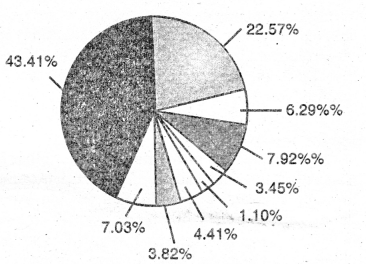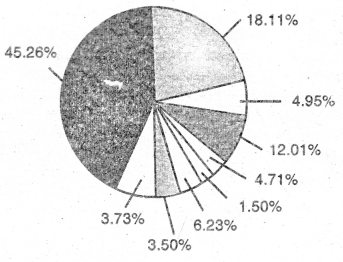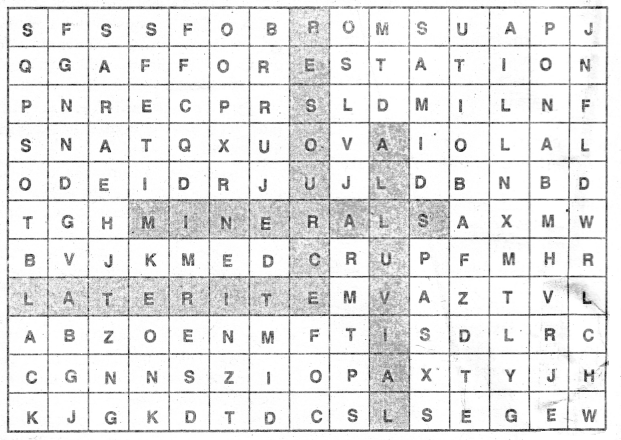I. Multiple Choice Questions
Question 1.
Which one of the following type
of resource is iron ore?
(a) Renewable
(b) Flow
(c) Biotic
(d) Non-renewable
Answer:
(d) Non-renewable.
Question 2.
Under which of the following
type of resource can tidal energy be put?
(a) Replenishable
(b) Abiotic
(c) Human-made
(d) Non-recyclable
Answer:
(a) Replenishable.
Question 3.
Which one of the following is
the main cause of land degradation in Punjab?
(a) Intensive cultivation
(b) Over
irrigation
(c) Deforestation
(d) Overgrazing
Answer:
(a) Intensive cultivation
Question 4.
In which one of the following
states is terrace cultivation practised?
(a)
Punjab
(b) Haryana
(c) Plains of Uttar Pradesh
(d)
Uttarakhand
Answer:
(d) Uttarakhand
Question 5.
In which of the following states
is the black soil found?
(a) Jammu and
Kashmir
(b) Rajasthan
(c) Gujarat
(d) Jharkhand.
Answer:
(c) Gujarat.
2. Answer the following questions in about 30 words.
Question 1.
Name three states having black
soil and the crop which is mainly grown in it.
Answer:
Maharashtra, Madhya Pradesh,
Chhattisgarh. Cotton is the crop which is mainly grown in the black soil.
Question 2.
Which type of soil is found in
the river deltas of the eastern coast? Give three main features of this type
of soil.
Answer:
Alluvial soil is found in the river deltas of the eastern coast.
The three main features of this type of soil are;
- It contains proportions of sand, silt and clay;
- It is highly fertile land; and
- It contains proportion of potash, phosphoric, acid and lime.
Question 3.
What steps can be taken to
control soil erosion in the hilly areas?
Answer:
The following steps can be taken
to control soil erosion in the hilly areas:
- Deforestation should be stopped;
- Over-grazing needs to be controlled; and
- Steps can be taken to control the running water.
Question 4.
What are the biotic and abiotic
resources? Give some examples.
Answer:
Biotic resources are those which are obtained from biosphere. Such resources
have life. Some examples of biotic resources are: human, flora and fauna,
fisheries, livestock etc.
Abiotic resources
are all those which are composed of non-living things. These include rocks and
metals.
3. Answer the following questions in about 120 words.
(a) Explain land use pattern in India and why has the land under forest not
increased much since 1960-61?
Answer:
Land utilization is useful for vegetation, wildlife, human life and economic
activities. The land resources are used for forest, farming, pastures,
industries and the like. The land use pattern in India can be stated through
the following figure: Figure.: 1 indicates the land use pattern in 2003-04 and
Figure: 2, that of 1960-61 Figure 1: General land use categories 2000-2003.
Forest
Area under non-agricultural use
Barren and wasteland
Permanent Pastures
and Grazing land
Area under misc. Tree crops
and Groves
Culturable Waste
Fallow other than Current Fallow

- Current Fallow
- Net Sown Area
Figure 2: General land use categories 1960-61 Forest
Area under non-agricultural use
Barren and
wasteland
Permanent Pastures and Grazing
land
Area under misc. Tree crops and Groves
‘
Cultural Wasteland
Fallow other than current Fallow’
Current
Fallow

(b) Net Sown Area – The land use under
the forest cover has, since 1960-61, increased 4.56%, though land under forest
cover has to be around one-third of the total land. Indeed, the increase has
not been much. The main reasons are: over-grazing still continues and forest
land is oftenly made use of for purposes such as farming and industries.
(ii) How have technical and economic development led to more consumption of
resources?
Answer:
As we develop economically and technically, the consumption of our natural
resources increase. Resources help us develop and this development is possible
only through the development of oitr technology techniques and machines. More
we use technology, more we exploit out natural resources and more we consume
them which ultimately lead us to development.
The availability of resources is no guarantee for development of people. Development requires development of technology technote to use and consume our resources. Resources contribute to our development only when they are accompanied by appropriate technological development. The use and consumption of resource constitute the use of technology on the one hand and the resultant development of the society on the other.
Project Activity

Question 1.
Natural endowments in the form
of land, water, vegetation and minerals.
Answer:
Resource.
Question 2.
A type of non-renewable
resource.
Answer:
Minerals.
Question 3.
Soil with high water-retaining
capacity.
Answer:
black soil.
Question 4.
Intensively leached soils of the
monsoon climate.
Answer:
Latente
Question 5.
Plantation of trees on a large
scale to check soil erosion.
Answer:
Coricour, gullies.
Question 6.
The Great Plains of India are
made up of these soils.
Answer:
Alluvial.